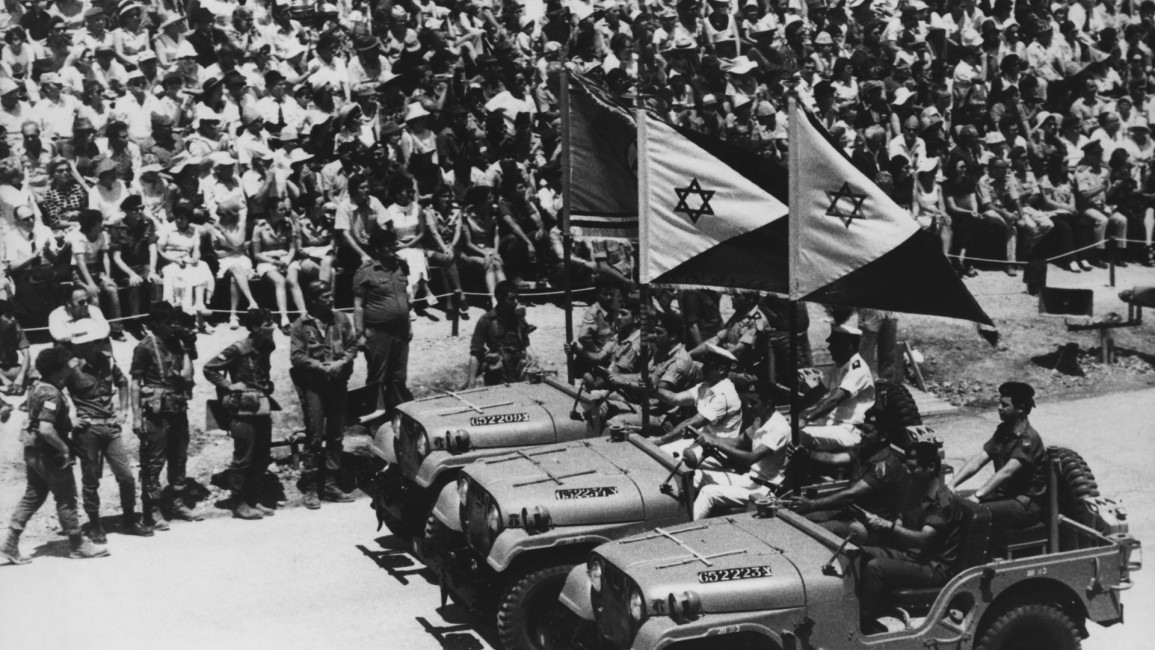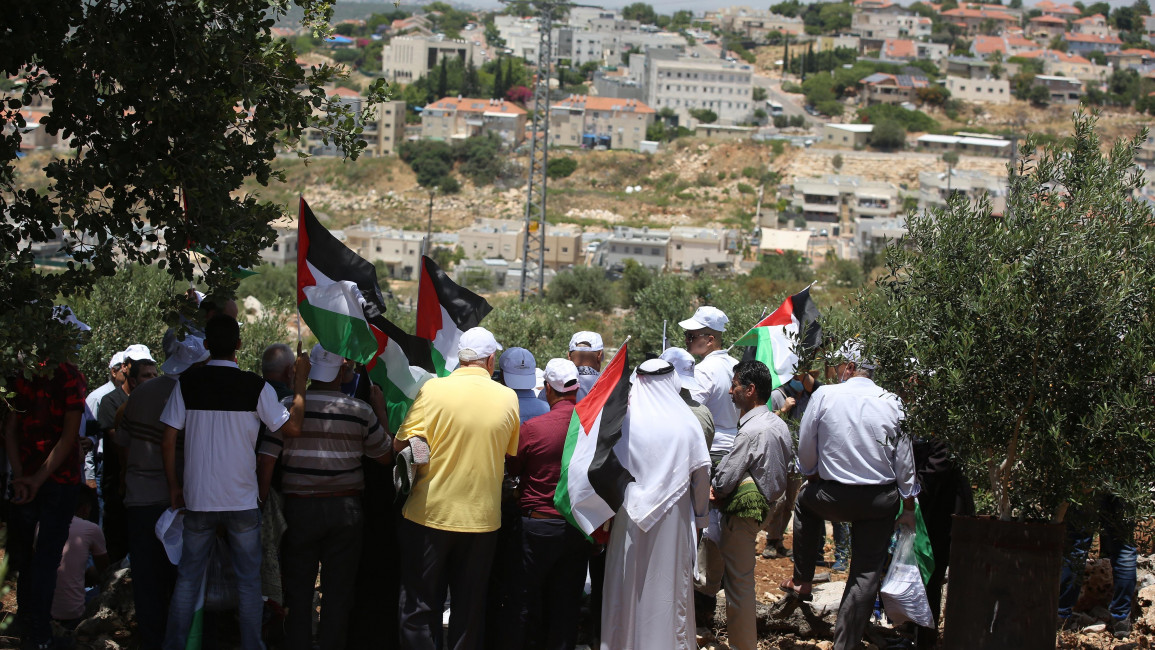
55 years in exile: Diaspora Palestinians on the War of 1967

Like hundreds of thousands of Palestinians, Eman Odeh, 23, can pinpoint the date of her family’s exile from Palestine to June of 1967.
Both her grandfathers served in the Jordanian army at the time and fought to defend the West Bank village they were from, Faqua, which sits a few kilometres north of Jenin.
"My grandmother purposely left all her fabric exactly where it was at home because she thought she’d come back and finish her sewing"
On June 5, 1967, Israel launched a surprise attack on Egyptian air forces, setting forth what came to be known as the Six-Day War between Egypt, Syria, Jordan, and Israel.
In under a week, Israel defeated the Arab armies and seized Palestinian territories in the West Bank, East Jerusalem, and Gaza, along with the Golan Heights in Syria and the Sinai Peninsula in Egypt.
This event, forever engrained in the history of Palestinian families, came to be known as the Naksa, a term which means “setback” in Arabic.
Following the defeat, Eman’s parents, who were both children at the time, were forced to flee by foot. It took them two days to reach Jordan, where they stayed in a refugee camp before resettling in Jordan permanently. They had no idea that they would never be able to live in Palestine again.
“My grandmother purposely left all her fabric exactly where it was at home because she thought she’d come back and finish her sewing,” said Eman.
|
The effects of the Naksa were not limited to 1967, but have had vast ripple effects on much of Palestine and the diaspora today. Her family members were among the nearly 400,000 Palestinians displaced during the catastrophic defeat of the Six-Day War which also marked the start of Israel’s illegal military occupation of historic Palestine.
The term “Naksa” was coined by Muhammad Hassanein Heikal, an Egyptian journalist and close associate of Egypt’s president at the time, Gamal Abdel Nasser.
According to historian Sherene Seikaly, the word “Naksa” does not accurately reflect the magnitude of 1967.
“When Hassanein Heikal came up with [the term], it was really about trying to both make a rhythmic analogy to the Nakba, but to make it seem like something that was just a minor diversion from a forward-moving path, as opposed to what it actually was, which was a complete catastrophe,” said Seikaly.
“[The term] was an attempt to recuperate the defeat and recuperate Nasser’s image in the wake of that defeat.”
The Naksa was a continuation of the Nakba or “catastrophe” in 1948, which was the first mass exodus of Palestinians from their homes by Zionist militias in which over 700,000 Palestinians were displaced and thousands of others were massacred.
Stories from 1967 have been passed down to Palestinians living in the diaspora orally by family members. Eman’s father tells her he remembers the Naksa even more clearly than his wedding day.
“I just remember my dad having a map of Palestine in his bedroom and every morning when I went to say hi to him he would say, ‘Point to home, point to Faqua"
Eman and her family eventually moved to Qatar before recently resettling in the United States. Although she’s never been able to visit Palestine, she grew up hearing about her village from her parents and grandparents.
“I just remember my dad having a map of Palestine in his bedroom and every morning when I went to say hi to him he would say, ‘Point to home, point to Faqua,’” said Eman.
“Even though I’ve never been to Palestine, I have such a strong connection to the land because of all the stories I heard growing up.”
Farrah Koutteineh, 24, the head of public relations at the UK-based advocacy group, the Palestinian Return Center, also grew up hearing about 1967 from her father, who was a teenager at the time.
Her family is from Jerusalem’s Old City, which came under direct Israeli rule after 1967.
“My father saw family members get murdered, he witnessed people defiantly protecting their homes until their last breath against Israeli tanks and bulldozers trying to destroy their homes,” said Koutteineh.
The Naksa resulted in the displacement of a majority of Farah’s family members from their ancestral homes in the Old City. Her family members describe the demolitions of homes near the Western Wall immediately following the Six-Day War, some of which were demolished while people were still inside.
"The Naksa paved the way for theft of Palestinian homes from 1967 to current day through various colonial mechanisms, from the Allon Plan to the illegal annexation of Jerusalem. Annexation that essentially legalised theft"
“It is important to inform people about the Naksa because people don’t realise the mass murder and exodus of Palestinians came in two waves,” she said.
“The Naksa paved the way for theft of Palestinian homes from 1967 to the current day through various colonial mechanisms, from the Allon Plan to the illegal annexation of Jerusalem. Annexation that essentially legalised theft.”
|
Today, most of her family lives in the diaspora, scattered across countries in the Middle East, North America and Europe.
For Palestinian American activist Jude Husein, 24, educating people about Palestinian history is crucial.
"Her father was a teenager at the time and remembers hearing warning shots and seeing smoke. It was clear to him that his family was in imminent danger"
“Young people and older generations alike need to continue telling the stories,” said Jude.
“I see the world understanding the Palestinian struggle as a struggle for freedom, just like every other struggle that mankind has seen and contextualized through freedom. We're not just victims of oppression. We're educators, we're poets and artists, creative minds, musicians.”
Jude’s family was also forced to leave their home in the West Bank village of Ein Yabrud in 1967.
Her father was a teenager at the time and remembers hearing warning shots and seeing smoke. It was clear to him that his family was in imminent danger.
At the time, his sister had gone out to get water and was separated from the rest of the family. As they fled to Jordan on foot, they searched for her and eventually found her hiding among corpses of soldiers and other Palestinians in an abandoned home.
After staying in Jordan for two months, Jude’s family was eventually able to return to their village.
For Jude, the biggest takeaway from hearing these stories about her family growing up was learning about the strength and resilience of Palestinian women, which she said gives her hope for a free Palestine.
“If we can survive all of this time, then that shows that when there's a will there's a way and there's always a light.”
Reem Farhat is a freelance reporter and a Journalism Masters student based in New York City





![President Pezeshkian has denounced Israel's attacks on Lebanon [Getty]](/sites/default/files/styles/image_684x385/public/2173482924.jpeg?h=a5f2f23a&itok=q3evVtko)



 Follow the Middle East's top stories in English at The New Arab on Google News
Follow the Middle East's top stories in English at The New Arab on Google News


